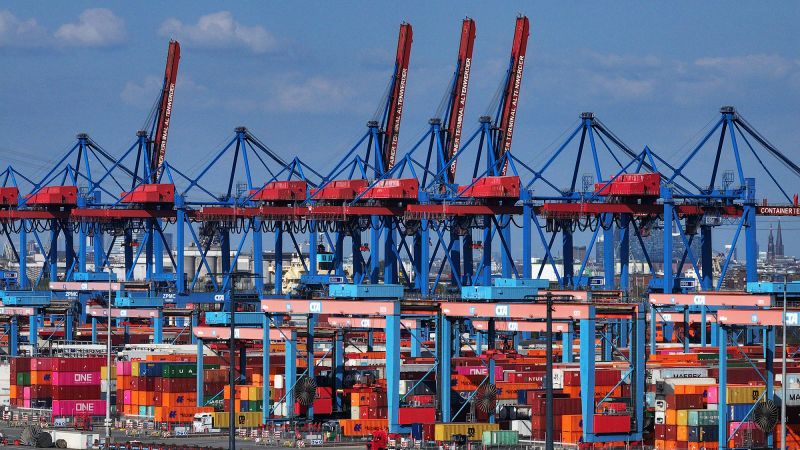IMF Upgrades Global Growth Forecast on Weaker US Dollar

Introduction
The International Monetary Fund (IMF) has recently upgraded its global growth forecast, citing the weakening of the US dollar as a contributing factor. This comes as a welcome surprise to many, as it helps to offset the negative impact of US President Donald Trump's tariffs on the world economy.
Key Details
The IMF's decision to revise its growth forecast is based on the fact that the US dollar has been steadily losing value against other major currencies. This has made it more affordable for other countries to invest in US goods and services, helping to boost the country's economy. In addition, the weaker dollar has also made it more difficult for the US to implement its tariffs, as it becomes more expensive for other nations to import American products.
Impact
The IMF's upgrade in global growth forecast is a positive sign for the world economy, especially in the face of ongoing trade tensions. It highlights the importance of currency values and their role in international trade and economics. In the long run, a weaker US dollar may also help to improve the country's trade deficit, as other nations become more willing to purchase American goods and services. However, some experts caution that the impact of a weaker dollar may not be sustainable in the long term and could potentially lead to inflation in the US.
About the People Mentioned
Donald Trump
Donald John Trump, born June 14, 1946, in Queens, New York, is an American businessman, media personality, and politician. He graduated from the University of Pennsylvania’s Wharton School in 1968 with a degree in economics. In 1971, he took over his family’s real estate business, renaming it the Trump Organization, through which he expanded into building and managing skyscrapers, hotels, casinos, and golf courses. Trump gained widespread fame as the host of the reality TV show *The Apprentice* from 2004 to 2015, which helped establish his public persona as a successful entrepreneur. Trump entered politics as a Republican and was elected the 45th president of the United States, serving from 2017 to 2021. His presidency was marked by significant policy actions including tax cuts, deregulation, the appointment of three Supreme Court justices, renegotiation of trade agreements (notably replacing NAFTA with the USMCA), and a focus on immigration control including border wall expansion. He withdrew the U.S. from international agreements such as the Paris Climate Accord and the Iran nuclear deal, and engaged in a trade war with China. His administration’s response to the COVID-19 pandemic was criticized for downplaying the virus’s severity. Trump was impeached twice by the House of Representatives—first in 2019 for abuse of power and obstruction, and again in 2021 for incitement of insurrection—but was acquitted by the Senate both times. After losing the 2020 election to Joe Biden, Trump challenged the results, culminating in the January 6, 2021, Capitol riot. He remains a central figure in American politics, having won the 2024 presidential election and returned as the 47th president in 2025, continuing to promote policies aimed at economic growth, border security, and military strength[1][2][3][4].
About the Organizations Mentioned
International Monetary Fund
The **International Monetary Fund (IMF)** is a global financial institution founded in 1945 with 191 member countries. Its core mission is to promote international monetary cooperation, secure financial stability, facilitate international trade, encourage sustainable economic growth, and reduce global poverty[1][2]. The IMF emerged from the 1944 Bretton Woods Conference, initially overseeing the fixed exchange rate system, and has since evolved into a crucial institution managing balance-of-payments crises and supporting countries through economic challenges[2]. The IMF operates by pooling financial resources from its members through a quota system, which determines both their financial contributions and voting power. When member countries face balance-of-payments problems, the IMF provides loans and concessional financial assistance to stabilize economies[1][2]. These loans often come with policy reform requirements, known as structural adjustments, aimed at restoring economic stability and growth. Besides lending, the IMF plays a vital role in economic surveillance by continuously monitoring global and regional financial developments and advising governments on sound economic policies[1]. It also offers technical assistance and training to strengthen member countries' economic institutions in areas such as taxation, monetary policy, and financial regulation[1]. Key achievements of the IMF include its pivotal role in maintaining global financial stability during various crises, including the post-World War II reconstruction, the transition after the collapse of the Bretton Woods system, and ongoing support amid globalization challenges[2]. The IMF’s World Economic Outlook reports provide influential analysis and forecasts impacting business and policy decisions worldwide[3][4][5][6]. Currently headquartered in Washington, D.C., the IMF remains a central actor in global economic governance, fostering dialogue among nations and adapting to emerging challenges such as inflation, fiscal sustainability, and technological changes affecting economies[1][3][4]. Its ability to blend financial support, policy advice, and capacity development makes it indispensable for countries navigating complex economic landscapes.










